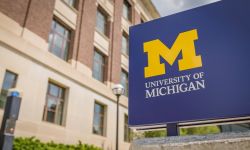Michigan State University, U-M will require COVID booster shots

Students, staff and faculty at Michigan State University and the University of Michigan will be required to get COVID-19 booster shots, beginning in January.
Several universities and colleges already require COVID vaccinations for those without approved religious or health-related exemptions. MSU was the first public university in the state to announce booster requirements, followed hours later by U-M.
The U-M booster requirement applies to the Ann Arbor campus, as well as UM-Dearborn and UM-Flint.
The MSU requirement affects about 70,000 people who are employed by the MSU or are enrolled in classes.
Related:
- Michigan has an obesity problem. That could make COVID even worse
- As COVID-19 surges in Michigan, no new restrictions planned by state
- Omicron variant arrives in Michigan. What you need to know
According to a letter sent Friday by MSU President Samuel Stanley, students, staff and faculty who have received their two-dose COVID vaccinations more than six months ago, or a one-dose regimen more than two months ago, are eligible for a booster and should arrange to get the jab before classes resume Jan. 10, after the holiday break.
“Those who fail to receive a booster when eligible will be considered noncompliant with MSU’s vaccine directives,” Stanley wrote. “You can find a vaccine booster near you by visiting our Together We Will website.”
MSU required proof of COVID vaccination for the current fall semester. About 91 percent of students are vaccinated, according to data collected by the university, with a similar rate at the University of Michigan. With many universities requiring vaccinations, COVID outbreaks that were common on campuses in the fall of 2020 were almost nonexistent this fall.
By November, MSU had terminated two employees and suspended 16 students for noncompliance with school COVID policies.
Some students, staff and faculty have approved exemptions. Those with current exemptions will continue to have exemptions to the booster requirement.
All students, staff and faculty will continue to be required to wear face coverings while inside campus buildings.
“CDC (The federal Centers for Disease Control and Prevention) data suggests COVID-19 boosters help broaden and strengthen the protection against Omicron and other variants and will be essential for continued in-person learning and operations,” Stanley wrote. “We know our COVID-19 directives are working to mitigate the spread of the virus, and this is an important next step.”
In a separate recent statement about the university’s pandemic response, Stanley said “I know the past 20 months have been difficult for so many of us, and I realize that we all wish this pandemic was behind us. But it’s not, and we will continue to make decisions based on our commitment to health and safety.”
Both universities referenced concerns about the omicron variant in their statements. U-M said the omicron variant “has been detected within the U-M community.”
In-person classes begin in Ann Arbor Jan. 5, and students, staff and faculty have until Feb. 4 to get the additional shot.
There will be heightened testing protocols for U-M students living on campus, and students will be expected to wear masks in common areas of residence halls regardless of vaccination status.
Winter commencement for graduating U-M students will continue as planned Dec. 19, with everyone required to wear masks.
Meanwhile, the U.S. Centers for Disease Control and Prevention offered guidance Friday that K-12 students who have been exposed to the coronavirus from close contact with someone who has tested positive, but who have not tested positive themselves, can continue in-person learning if they are regularly tested for the virus at school.
That guidance does not immediately impact Michigan schools, which are following recommendations from the Michigan Department of Health and Human Services.
Quarantines of K-12 students who’ve had close contact with classmates who’ve tested positive have wreaked havoc in Michigan schools, which are trying to maintain in-person learning this school year.
Michigan Education Watch
Michigan Education Watch is made possible by generous financial support from:
Subscribe to Michigan Education Watch
See what new members are saying about why they donated to Bridge Michigan:
- “In order for this information to be accurate and unbiased it must be underwritten by its readers, not by special interests.” - Larry S.
- “Not many other media sources report on the topics Bridge does.” - Susan B.
- “Your journalism is outstanding and rare these days.” - Mark S.
If you want to ensure the future of nonpartisan, nonprofit Michigan journalism, please become a member today. You, too, will be asked why you donated and maybe we'll feature your quote next time!





